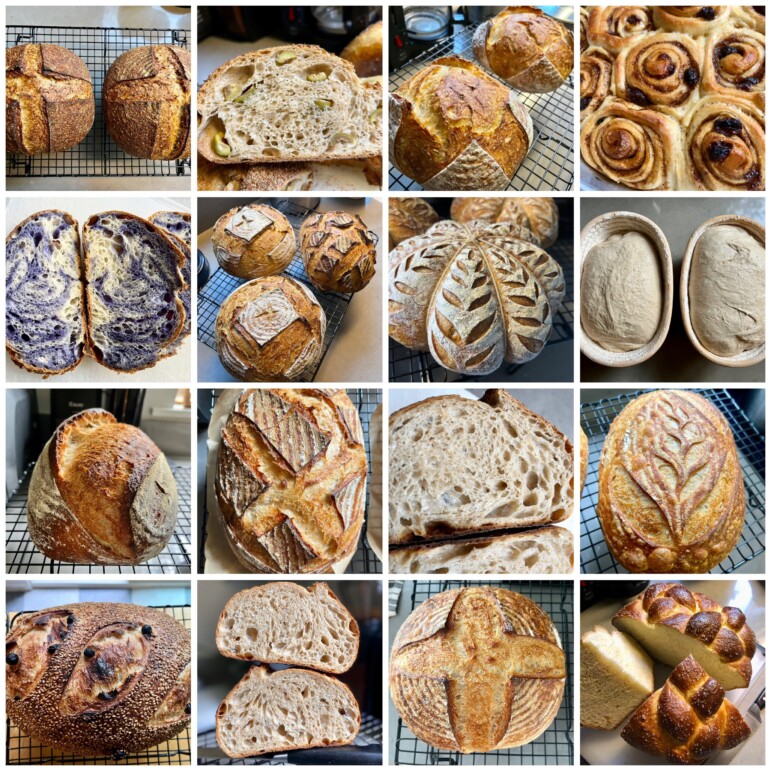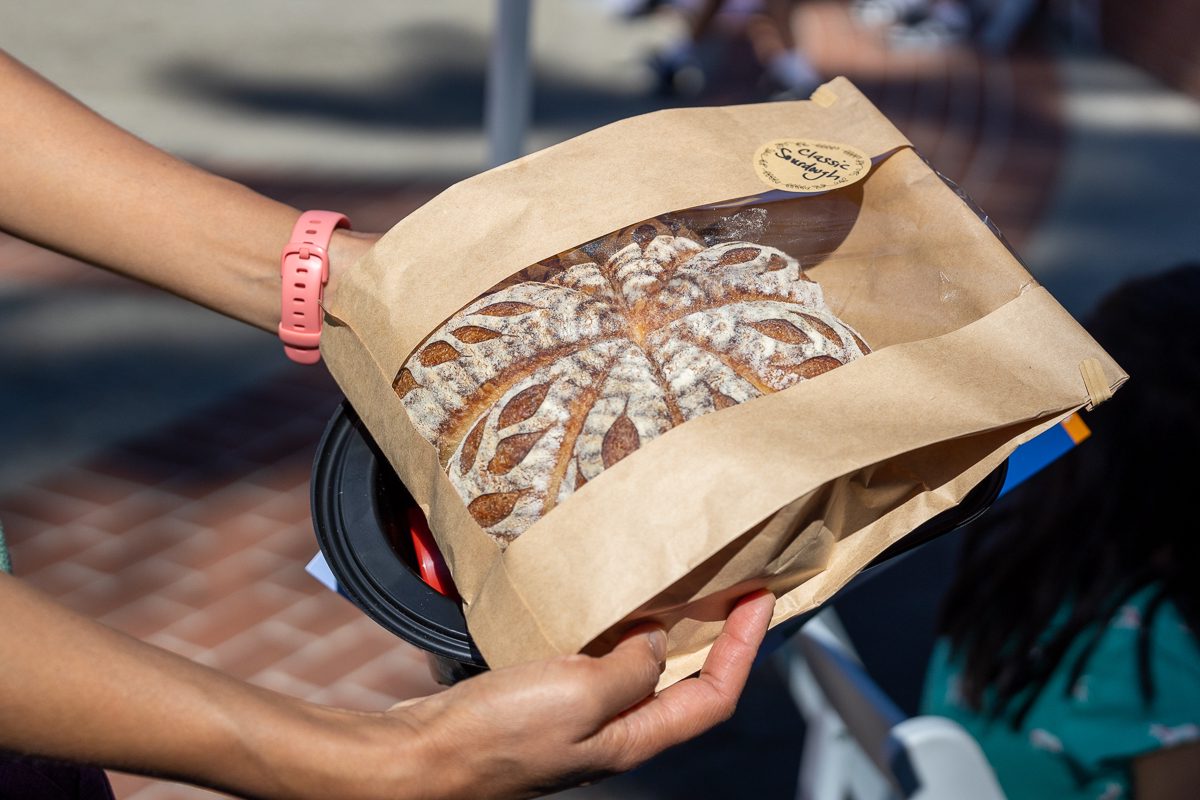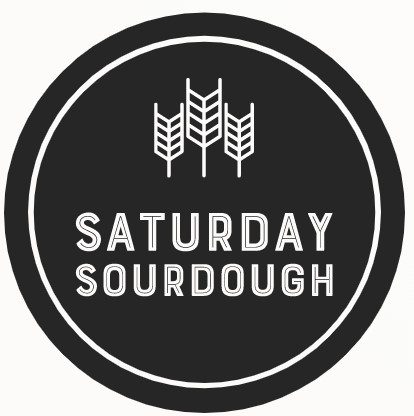Artisan sourdough bread baker and Piedmont resident Jovie Strzelecki has come a long way since 2008, when an attempt at the golden, pillow-shaped loaves of bread she recalled from her childhood failed to rise — or shine — in terms of appearance and flavor. “I hung up my apron, one could say, until the pandemic hit,” she said. “The scarcity of yeast for baking and the abundance of free time gave me opportunity to try different combinations of flour and sourdough techniques.”
The results, as evidenced by Strzelecki’s new home-based business, Saturday Sourdough, have gained immediate recognition and an avid following. At the annual Piedmont Harvest Festival, she was named the edibles contest winner, having won 11 ribbons — including four blue ribbons — for her bread, jams, sauce, and pickles. Strzelecki received the Bill Drum award as the participant with the most winning entries.
“Some people think of sourdough as a flavor, but really it’s a method of baking,” she said in a recent interview with the Exedra. “Sourdough is an ancient type of leavening that harnesses yeast and bacterial cultures from the environment to create airy texture and flavor in bread and other goods. Friendly strains of yeast are all around us. It’s in the flour we bake with in our kitchens, and even on our skin! And these unique blends vary from region to region, depending on the climate and individual micro-organisms in the area.”
Saturday Sourdough’s official launch as a small-batch cottage bakery was in August 2022. The bread and other goodies are made with artisan flours, whole grains, and simple ingredients like sprouted seeds and local honey. There are no preservatives and the yeast cultures are 100% homegrown by Strzelecki in the family’s home in Piedmont. Strzelecki’s full-time career and day job involves work as a clinical and dispensing audiologist whose patients have hearing loss, ear conditions, or vertigo imbalance problems. Her husband, Jake Strzelecki, is in marketing and is employed in the biotech pharmaceutical industry. Together, the couple have two children, Leo, age nine, and a daughter, five-year-old Ruby.

Strzelecki grew up in Clayton and says her mother was a baker who brought her into the bread-making fold in the early 1990s. “I grew up on the ‘The Tassajara Bread Book’ and a collection of recipes focused on whole grain, nutrition, and the meditative aspect of making bread,” she explained.
Strzelecki’s mother was Chinese and her maternal grandparents lived in Oakland’s Chinatown. “That meant we went to Peony Seafood Restaurant, where I’ve been going for decades. They lived near there and I would order roast duck, or the shrimp with mayonnaise and walnut. Their favorite appetizer was jelly fish and chicken feet, served cold. I never chose it, but the memory is still nostalgic and warm for me.”
From all sides of her family came the love of a challenge, the idea of the kitchen as an experimental lab. The results were either grand, or culinary lessons inspiring do-overs. During the pandemic as she conducted experiments, she soon found success and was making more bread than her family could eat — and eventually, more than could be given away to eager friends and family recipients. Encouraged by the response, she consulted with professional baker colleagues who helped her launch Saturday Sourdough.
“They gave advice about scaling up a recipe. When you normally make a couple loaves and now make 18, it’s more complex. There’s temperature control, the environmental factors. The process is different when it’s hot: the fermentation rate increases, the balance of yeast to bacteria in the dough means it can become too acidic. I modify the amount of starter, the temperature of the water and the length of time the dough is allowed to ferment. I can course correct during the process, but it’s instinct based on experience.”
The flour is sourced from mills that specialize in less-processed, mostly organic, heritage flours. Strzelecki uses local tap water that she says is high quality and, when adding in other ingredients, reaches for unsulfured dried fruits and organic nuts and seeds. The most popular bread is the classical white sourdough, followed by variations she rotates according to the freshness of ingredients available or simply by an idea she comes upon. Although she has studied and practiced techniques taught in cookbooks such as Chad Robertson’s “Tartine Bread” and Ken Forkish’s “Flour Water Salt Yeast,” and on blogs like “The Perfect Loaf” she no longer relies on written recipes.
“There is a certain achievement that comes from learning to make bread without a recipe. The sources of inspiration give me technical information, but what if I alter a bread by, instead of using wheat, using sprouted rye? What if I boil the rye? What if I use a different amount of water? What if I use a mental formula and modify it by jumping off and experimenting? “Food Geek” is another blog that’s great because he does controlled experiments with sourdough to make the best bread that he can. When I bake now, I don’t open a book. I go off what I know or what I’ve tried and take it from there.”
Strzelecki advises bakers new to sourdough to write off their first 10 loaves. “I’ve made my share of frisbees and hockey pucks. Those first loaves, they might be inedible, they might be great. That’s the learning curve. I have a friend who’s a professional baker and uses the criteria of it taking one year baking sourdough or 100 loaves to reach proficiency.”
For now, Strzelecki is content for her business to stay small; she bakes primarily on Saturdays and delivers her breads locally or sells loaves at community events and markets. “As long as it’s still enjoyable and the community demand is there, I’ll continue to do it. If it stays small-scale and that’s what works best with my family, I’ll do that. But I can see a future where I have commercial equipment and can build out. I like keeping that option open.”
Photos from https://www.saturdaysourdough.com/


Wonderful, well written article. Nice overview of Jovie’s life long interest in bread baking.